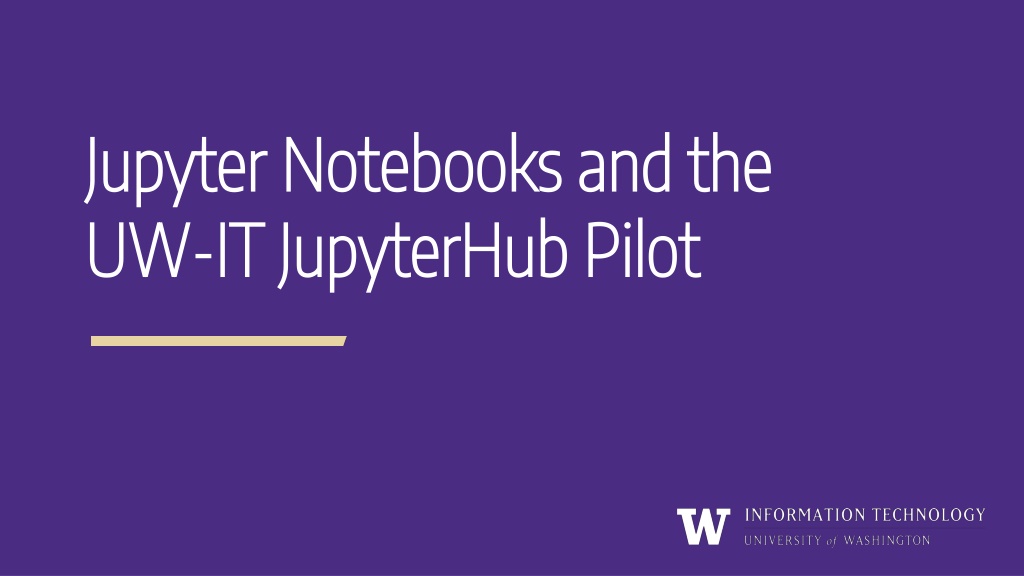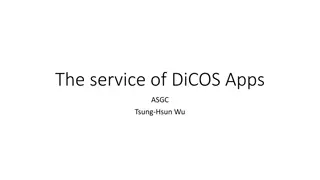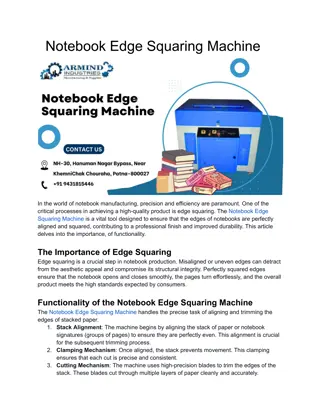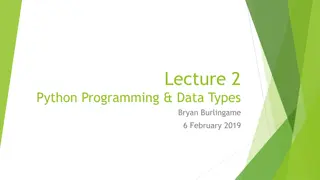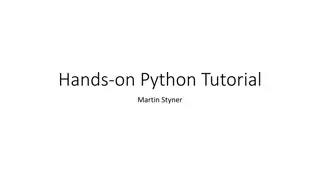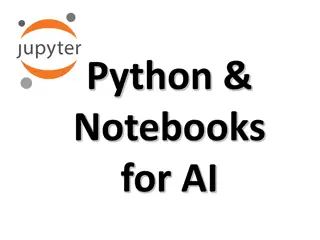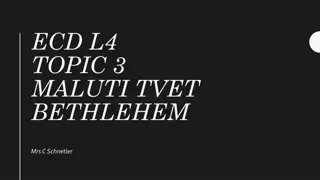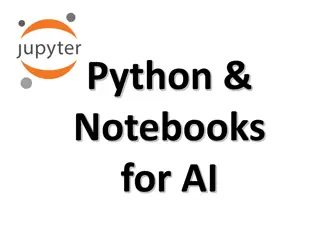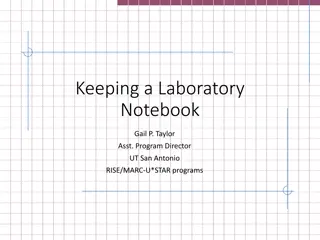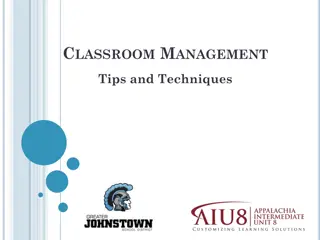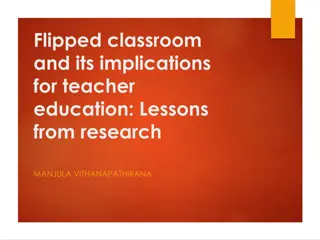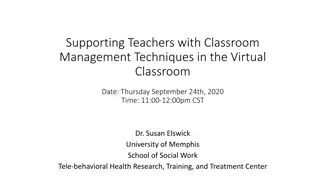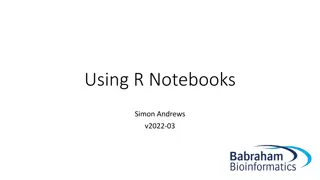Enhancing Classroom Learning with Jupyter Notebooks at UW-IT
The University of Washington's Information Technology (UW-IT) department implements JupyterHub to provide students and instructors with computational environments through Jupyter Notebooks. This initiative offers a hassle-free solution for accessing programming resources and course materials. The pilot study aims to identify support issues, pedagogical challenges, and opportunities for integrating Jupyter notebooks in the classroom setting. The participants from diverse departments engage with Jupyter notebooks to enhance teaching and learning in various courses, spanning geospatial data analysis, astrostatistics, stellar observations, and more.
Download Presentation

Please find below an Image/Link to download the presentation.
The content on the website is provided AS IS for your information and personal use only. It may not be sold, licensed, or shared on other websites without obtaining consent from the author. Download presentation by click this link. If you encounter any issues during the download, it is possible that the publisher has removed the file from their server.
E N D
Presentation Transcript
Jupyter Jupyter Notebooks and the Notebooks and the UW UW- -IT IT JupyterHub JupyterHub Pilot Pilot
Jupyter Notebooks and JupyterHub > Jupyter Notebooks and JupyterHub give users access to computational environments and resources without the hassle of installation and maintenance tasks. > Jupyter Notebooks are web-based interactive computational environments that are pre-provisioned with course material. > Students connect each to their own copy of the environment and develop content as directed, often writing short segments of code.
The UW-IT Service > UW-IT sets up a Docker container for instructors to integrate alongside JupyterHub. (Alternatively, instructors can provide and configure their own Docker container.) > Each student enrolled in a course receives access to a Jupyter notebook. > UW-IT runs the infrastructure at no cost to instructors.
Jupyter Notebooks in the Classroom > Strong potential as a teaching tool for both specific course content and programming languages Flexibility for instructors and students Accessible coding environment to learn and utilize Python > Highly relevant for investigations in applied academic research
Pilot Study Goals 1. Determine support issues that would need to be addressed for a campus-wide rollout 2. Identify pedagogical challenges/opportunities related to integrating Jupyter notebooks in the classroom Winter 2020 1 early adopter Spring 2020 6 participants from 3 departments
Participants Term Name Title Department Winter David Shean Assistant Professor Civil and Environmental Engineering Spring Sarah Tuttle Assistant Professor Astronomy Mario Juric Associate Professor Astronomy Nicole Kelly Lecturer Astronomy Lutz Maibaum Lecturer Chemistry Alexandra Anderson-Frey Assistant Professor Atmospheric Sciences Chad Curtis Lecturer Chemical Engineering
Courses Term Course Number Title Winter Civil and Environmental Engineering 498/599 Geospatial Data Analysis Spring Astronomy 480 Introduction to Astronomical Data Analysis Astronomy 324 Introduction to Astrostatistics and Machine Learning in Astronomy Astronomy 421 Stellar Observations and Theory Chemistry 553 Statistical Mechanics Atmospheric Sciences 493 Data Analysis for Atmospheric Sciences Chemical Engineering 599 Image Analysis for Scientists and Engineers
Assessment Methods > Winter 2020 > Pre- and post- interview with instructor > Class observation > Post-quarter student survey > Spring 2020 > Pre- and post- interviews with instructors
General Findings > The service was well received by instructors and students; both noted ease of use and Jupyter notebooks power as a learning tool. > Winter 2020: UW-IT successfully supported an edge case requiring complex setup and high level of resources. - Level of individual support required by UW-IT with such a case is not currently scalable to multiple instructors. > Spring 2020: Standard setup worked seamlessly for multiple instructors.
Findings: Engagement & Interaction > Use of Jupyter notebooks and JupyterHub during class contributes to engaging and interactive learning spaces. Students were able to follow instructor and test code in their own environment and at their own pace. > Jupyter notebooks work well for remote learning. Students worked together on coding problems in synchronous Zoom break-out rooms during class and asynchronously through other communication channels (e.g., Slack, email). Some features in Zoom (e.g., remote control) may even offer pedagogical advantages over a computer lab for in-class learning.
Findings: Student Learning > Students appreciated a greater focus on course content and programming skills, instead of focusing on technology setup. > Students appreciated the opportunity to directly apply their course learning to real-world research questions and projects. Jupyter notebooks are excellent supplements for portfolios since they include example code and highlight writing and communication skills.
Findings: Instruction > Jupyter notebooks were easily adapted to a flipped classroom model. Instructors pre-recorded lectures and used course time for peer collaboration and troubleshooting within notebooks. > Common options allowed instructors to convert their notebooks to slide decks, streamlining lecture preparation. > Instructors were able to write custom scripts to seamlessly integrate JupyterHub file directories with GitHub repositories. Instructors can host data and code in GitHub and push updates to student directories.
Considerations > Instructors may want to choose their feedback and grading tools based on individual course learning objectives. > Common Solutions: Canvas integration, GitHub, syncing student-instructor directories, nbgrader > More advanced JupyterHub instructors with custom and/or complex needs may require admin privileges to add needed packages or manage resources. > As with all remote learning, students internet quality and stability is a potential issue when accessing cloud environments.
Interested? > UW-IT is currently signing up faculty for Fall 2020 > Service is open to all UW instructors using Jupyter notebooks in a course > Go to IT Connect to learn more: https://itconnect.uw.edu/learn/tools/research-tech/
